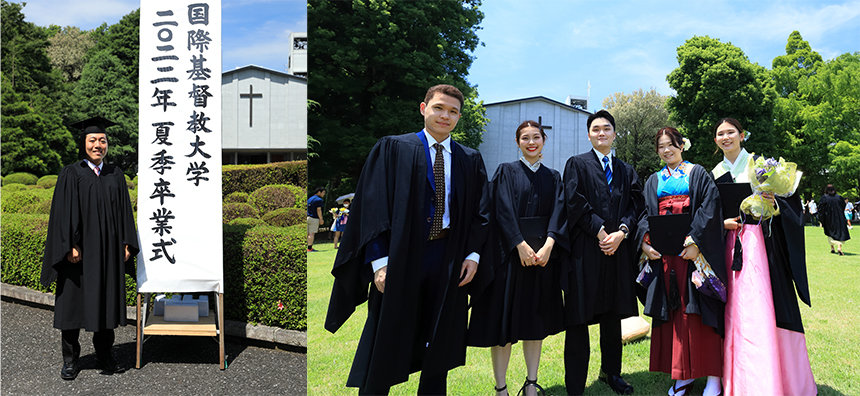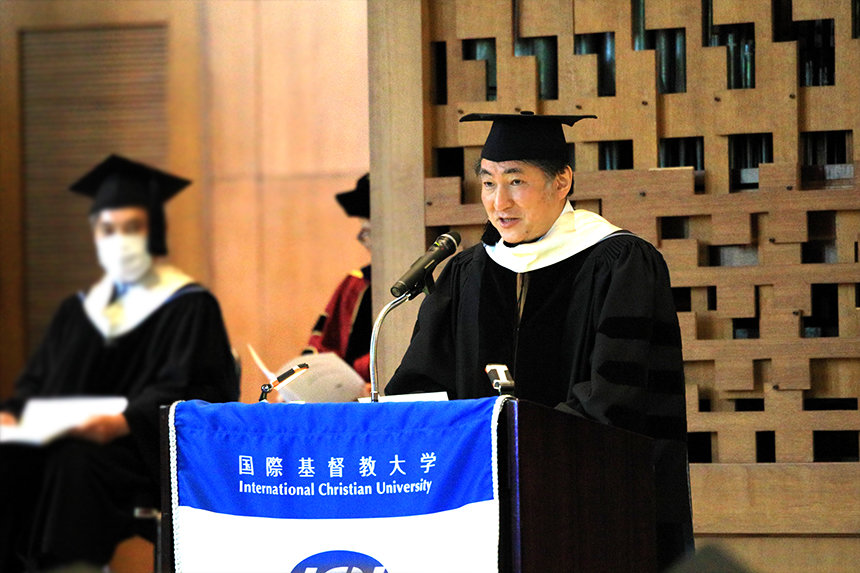NEWS
2022 Summer Commencement Ceremony
Update: June 29, 2022

129 undergraduate students and 26 graduate students graduated from ICU at its summer commencement ceremony held at the University Chapel on Wednesday, 29 June.
At the ceremony, each student's name was read out in keeping with tradition that has continued since the first commencement ceremony. To prevent coronavirus infection, only graduates attended the ceremony.
Also during the ceremony, the title of Professor Emeritus was conferred to Professor Anri Morimoto, with effect from April 1, 2022.
Commencement Address by Shoichiro Iwakiri, President

First Corinthians 13 : 1-3
Congratulations to all who have completed your Bachelor of Arts program in our Division of Arts and Sciences as well as to those who have finished the MA or PhD programs in our Graduate School of Arts and Sciences and who are graduating today. I also offer my sincere congratulations to all family members, relatives and friends of our graduates who are attending the ceremony online on campus, at home or in other places.
Over the past two years, you have had to adapt to the new environment of higher education, which has been drastically transformed as a result of the new coronavirus prevention measures. I am sure that each one of you has faced many hardships. I would like to express my sincere respect for your efforts and endeavors - and, for the fact that, despite these difficulties, you have maintained your firm commitment to your studies and research, and have successfully completed your thesis writing. Since April this year, our ICU campus has returned to its typical atmosphere, filled with the merry voices of so many people. It is with great joy that I am able to celebrate your commencement.
After today, you will move on to the next stage of your life, maybe working in a company or continuing on to higher education. Most of you will be entering the real world where you will need to support your own material lives. To you, I would like to offer the words of Baudelaire, a French poet of the 19th century. He said: "Anyone in good health can go two days without eating, but never without poetry" ("Advice to Young Men of Letters")
This sentence, of course, echoes a biblical passage. When Jesus was hungry after fasting for forty days and forty nights, the devil approached him and tempted him, saying, "If thou art the Son of God, why don't you command that these stones become bread?" Jesus' answer was, "Man does not live by bread alone, but by every word that comes from the mouth of God" (The Gospel of Matthew 4:4).
The degree of hunger would be quite different between 40 days and nights and two days. But let's ignore that point. Is it nevertheless true that we cannot live two days without poetry? I don't think there are many people in the world today who love poetry that much. But let's take Baudelaire's word "poetry" in its meaning of "a world created by the imagination''. What Baudelaire is arguing is that we can endure the temporary deprivation of material gratification, but we cannot live if we are deprived of, or are forbidden to live in a world created by our imagination.
It is up to you how you perceive and evaluate this idea. I personally believe that, through your experience at ICU, you must have come to create another world within the real world, an inner world comprising images, memories, and spiritual elements, rather than simply of matter. As you continue to interact with various people and develop your lives, please respect this world of the mind within yourself and within others. I hope that you will continue to renew your relationships with people and things, and deepen your understanding of the meaning of existence and the meaning of life.
And as you do this, ask yourself if there is "love" in your thoughts, arguments and actions, as preached in today's Bible reading. And, if there is love, ask yourself on occasion what kind of love it is, because, even if it may seem as love to you, there is often another desire that is justified in the name of love.
Nowadays, the world seems to be in a state of confusion. But throughout history, this has always been the case. And we know that, in the midst of such chaos, there have always been those who have lit a light, those who have given vital energy to the hearts of people. From now on, I hope that each of you, as a graduate of ICU, will create a place where people can enjoy human dignity.
Finally, I wish you all a good life.
Professor Emeritus
Professor Morimoto started teaching and researching at ICU as an Associate Professor in 1997 and was promoted to Full Professor in 2001.
He has also contributed to ICU immensely as an administrator. In addition to serving 8 years as Vice President for Academic Affairs, he has served as Chair of the Philosophy and Religion Department, Director of the Hachiro Yuasa Memorial Museum, Director of the Institute for the Study of Christianity and Culture, and Director of the Religious Center.
